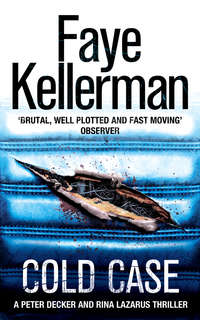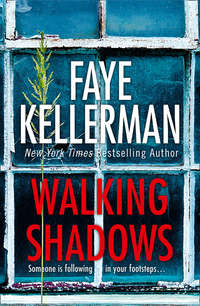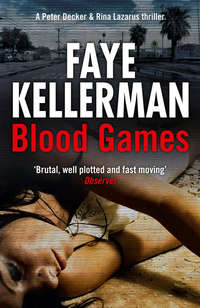
Полная версия
Bone Box
“Of course.”
“So …” She held up her hands in a shrug. “You must be going on something else.”
Decker said, “The body had long, dark hair. The coroner also described him as having piano fingers. There were remnants of nail polish on his fingers and toes. We also found an earring. We asked around the colleges and found someone who told us the description might match Lawrence. We don’t have a whole lot to go on and we may be completely wrong. And if we are, I’m sorry to put you through all this. But I’m following the meager leads we have.”
Joanne nodded. “So you know that Lawrence went to Morse McKinley.”
“Yes,” Decker said. “He dropped out after his junior year.”
“Do you know why?”
“I heard he dropped out to get hormonal treatments.”
“So you know.” She rolled her eyes. “He went around calling himself Lorraine. The boy always had a flare for the dramatic.”
“Tell me about him.”
“I have three children. The first two were just …” She threw up her hands. “Like normal people. Lawrence was the youngest and he was always different. Don’t get me wrong. I loved my son. I won’t exactly say I was supportive of his choices, but I accepted who he was. There are men who are gay. And then there are gay men. Lawrence fit the gay men category. Everything he did revolved around showing the world his sexual identity. And if you didn’t like it, he was right there in your face. I stopped counting how many times I got a call from high school: ‘Don’t worry. No one was hurt, but Lawrence got into an altercation.’”
“It can get wearisome.”
“You’ve got that right. Lawrence kept claiming he was being bullied and that he had to defend himself. That was probably true. There were a lot of, you know, regular kids who went to his high school. We have a lot of cops and firemen and just normal guys in the community. I’m sure the school wasn’t big on sensitivity training.”
“Do you think he was bullied?” McAdams asked.
“I don’t know. But he certainly didn’t act like a bullied teenager. He wasn’t the least bit withdrawn. He did really well in school. And he had friends, Detectives. Lots of friends. Lawrence could rein in the act if he had to. For instance, he never got into fights with the neighborhood boys. They liked him even though they knew what he was.”
“The people in college who knew him described Lawrence as very bright and very friendly.”
“All true.” She looked down. “Lawrence changed drastically after puberty. He became so overt. It was embarrassing at first, but eventually my husband and I got used to it. And, yes, Lawrence was very smart. Everyone knew that. His teachers knew that. They recommended Morse McKinley to him. He was always interested in government and economics.”
“Morse McKinley would be a good fit then,” McAdams said.
“We thought it would be a terrific fit. And we hoped that maybe he’d settle down in college with more expected of him. Of course, he just went even more extreme without any family constraints.” A shrug. “I may not have understood my son—he could be challenging—but I loved him.”
“Of course you did,” Decker said. “When did you find out he was undergoing hormonal therapy?”
“He told us right away. He announced: ‘I’m dropping out of school to become a woman.’ You know what my husband said?”
“What?”
“He said, ‘There aren’t women in college?’” Joanne shook her head. “I think it deflated the shock value that he hoped he’d get. Like I said, I loved my son. I would have loved him as a daughter.” Tears moistened her eyes. “Male or female.” The tears escaped and fell down her cheek. “When he started taking hormones … it seemed to me that he was starting to find peace. He took the test for his stock brokerage license and got a job with a small firm as a woman. He started dressing like a conventional woman—clothes, makeup, the whole bit. So maybe he did find his true self.”
She wiped her eyes with the back of her hand.
“He didn’t come around the house anymore—that was probably for our sake—but he did call. And we had normal conversations. He talked about work instead of his gender. It was refreshing. When he hadn’t called us in over two weeks, I got concerned.”
“Where was he living, Mrs. Pettigrew?”
“Joanne. He was living in the city, but I didn’t know where at first. Later on, after he went missing, I found out he was living in the East Village in a very nice studio apartment in a doorman building. So he must have been making money.”
“You were at his apartment?”
“Yes. When he stopped calling and wouldn’t answer his cell, I began to get very worried. I called up his work. I didn’t have the number, but I knew the name of the firm. After a couple of tries, I found the right branch. It’s when they told me he hadn’t been at work for the last two weeks. I became … that awful feeling of dread. Like his life on the fringes finally caught up with him.”
“His life on the fringes?” McAdams asked.
“Parties, alcohol, drugs, and lots of weirdos.”
“You think it was someone from his fringy life?”
“I don’t know. Maybe.”
“Do you have any names?” Decker asked.
“Not a one.” She waved it off. “Anyway, I finally got his city address from his work files and I went over to the apartment. At first, the super wouldn’t let me in. But I pleaded, and he finally opened the door.”
She stared off into space.
“His apartment was very large—superneat—he was always a neat person. There was no sign of him.”
“What about things in the apartment?” Decker asked.
“His clothes and personal items were still there.”
“Did you happen to check the refrigerator?”
“A few items—mostly water, beer, and club soda. I think Lawrence ate out a lot. I guess he could afford it. His clothes were nice—custom made to fit his body.”
“And that was the only time you ever visited his place?”
“No, there was another time afterward. The management called me to say he hadn’t paid his rent. At that point, I knew something was wrong. I told the police something was wrong. But they kept insisting that without anything to go on, they couldn’t do much. Lawrence could have disappeared on his own accord. When they found out he was undergoing a sex reassignment, they really stopped paying attention. They thought that if something terrible happened, it was because of his lifestyle. Which may be true. But that doesn’t mean you don’t investigate.”
Decker said, “You must have been frustrated.”
“Beyond frustrated. No one was listening to us.”
“What happened with his apartment?” McAdams said.
“I paid his unpaid bill for the month, but I told the apartment management I wasn’t paying anything else. I didn’t cosign the lease. I wasn’t obliged to pay them anything. After I explained the situation, the building supervisor let us in there to clean up. I boxed up Lawrence’s things …” She lowered her head. “My husband and I went through everything we could find. Every bill, every piece of correspondence, every scrap of paper. We didn’t find his phone or laptop or iPad. And the service providers wouldn’t give me access to his information because they didn’t know if Lawrence was alive or dead. He was a grown man—or grown woman. For all we knew, he could have been put in witness protection.”
“Why would you think that?” Decker said.
“Like I said, he knew a lot of counterculture people. Not that Lawrence seemed to be the type of guy to become an informant, but I really didn’t know a whole lot about his life, did I?”
“Right.”
“Besides, Lawrence bucked authority wherever, whenever. Anyway, when it was plain that he wasn’t going to suddenly show up, we hired a private eye.”
“And?”
“He talked to people—Lawrence’s old friends, his new friends, his friends on Facebook. The investigator talked to people Lawrence worked with, talked to old college friends and faculty. He charged us a lot of money. He got nowhere.”
“Did he give you the files, Mrs. Pettigrew?”
“He gave us a report. You can have it if you want. But if the body isn’t Lawrence, I’d want that back as well.”
“Of course,” McAdams said. “Could we have the PI’s name? He probably has an entire file on Lawrence—more than he included in the report.”
“His name is James Breck. He was a former New York police detective. He came highly recommended. My opinion is he was just churning up hours. But of course, I wasn’t thinking charitably about anyone at that point.”
“We’ll check him out,” Decker said. “Where is his office?”
“Somewhere in Queens. I have an address, but I don’t know if it’s current.”
“Anything you can give us will help,” McAdams said.
Decker said, “In the report, did he list the people he talked to?”
“I don’t remember. I haven’t looked at the report in a while. I did have a list of people that I thought he should talk to. If you hold on, I’ll get you the report and see what I still have in the file.”
“That would be great,” Decker said.
As soon as she left, McAdams said, “Breck is in Astoria.” He took out his cell and called him up. He reached a human voice. Surprise, surprise. “Hello, this is Detective Tyler McAdams from Greenbury Police Department in Upstate New York. I’m trying to get hold of James Breck … okay, do you have any idea how often he calls in for messages?” Tyler paused as he listened. “Could you please have him give us a call as soon as possible? It’s important … yes, thank you.” McAdams spelled his name and left both his and Decker’s cell numbers. He hung up.
“Answering service?” Decker asked.
“Yes. It’s strange to actually talk to someone. Here’s the address.” McAdams looked at his watch. It was seven in the evening. “I don’t think he’ll be in, but we could swing by and leave cards to show we’re serious.”
“Let me call Rina after we’re done here …” Decker stopped talking as Joanne Pettigrew came back into the room.
She said, “Yes, I suppose we did give James a list of all Lawrence’s friends.” She handed it to Decker along with a folder. “Tell me if you find anything interesting.”
“I’ll keep you posted.”
“Although I suppose you won’t want to be wasting your time if it’s not Lawrence.”
“I’ll be happy to look it over regardless.” Decker smiled. “Anything you’d like to ask me?”
She sighed again. “Not at the moment. Maybe I’ll think of something later on.”
“You have my number. Feel free to use it.”
“Thank you.”
There was a moment of awkward silence. Then Decker stood up and said, “Thank you for your time and for the dental X-rays. If we have something, I’ll let you know right away.”
He extended his hand and Joanne took it with the slightest of touches. No energy in the gesture. She had used up her reserves for the evening.
Chapter Seven
McAdams looked over Lawrence Pettigrew’s PI report as Decker drove back toward Brooklyn. Just as they wended their way over the bridge and into Flatbush, the Bluetooth kicked in. It was a number Decker didn’t recognize. He accepted the call.
“Decker.”
“This is James Breck.”
“Mr. Breck. Thank you so much for calling me back. I’m here with my partner, Detective McAdams.”
“What is this in regards to?”
“Lawrence Pettigrew.”
“Ah, so you found him … or her, I guess.”
“We don’t know. We’re in Brooklyn right now. You have a listed address in Queens. We can come to you.”
“I’m at home. I don’t have his folder on me. It’s in the office.”
McAdams said, “Is it possible to meet you at the office?”
“Let me think … maybe around nine.”
“Nine is fine. Thank you.”
Breck said, “Being that you don’t know if you found Lawrence or not, I’m assuming you found a body.”
“We did.”
“In an advanced state of decomposition.”
“Yes.”
“I have a copy of his dental records.”
“We got a set from Mrs. Pettigrew.”
“She has the originals so they’re probably better. I’ll see you later.”
“Thank you,” Decker said.
McAdams looked at his watch. “That’s an hour from now.”
“We’re ten minutes away from my son and daughter-in-law’s house. I’d like to stop in and say hello.”
“Sure.” McAdams paused. “Do you ever discuss your cases with your kids?”
“Not really, no, especially now that Sammy has a child. Parenthood is like the first stage of mortality. Once you have children, you realize you’re no longer invincible.”
After an interlude of coffee and cake with Rina, Sammy, and Rachel, the two detectives were off to Queens.
McAdams was unusually quiet.
“Tired?” Decker asked.
“No, I’m fine.” He paused. “It’s weird. This is probably the most I’ve ever seen of the other four boroughs. Well, three actually. We haven’t made it to the Bronx yet. To us Knickerbockers, the only city is Manhattan.”
“You’re an original Knickerbocker?”
“Not at all, but I have enough money to buy the title.”
The car’s navigation told Decker to turn right in one hundred feet.
“I really am sheltered,” McAdams said. “I only know Queens as an exit on the highway going to Kennedy. I really have to get out more.”
It took another ten minutes until the navigation informed them that they had reached their destination. It was a three-story ’60s-style office building—read it as no style—located in a strip mall. Breck’s office was above a fast-food sandwich shop, now closed, and next door to a Pilates studio, also shuttered. There was some illumination coming from behind the closed blinds. The door was locked: Decker rang the bell. Several footsteps could be heard before the door opened.
Breck was his fifties: short and slight, white hair that held hints of blond. Pale blue eyes were focused behind spectacles and a flared nose sat on a round face. His smile was white and broad. He immediately asked for ID. Decker showed him his badge, and he and McAdams went inside a one-room office. Furnishings included three desks, each with a computer, a printer, and a landline phone, two walls of file cabinets, a copy machine and a fax machine, a small kitchen bar with a coffeepot, a water cooler and a fridge, and a very big cardboard box that held a junk pile of laptops, phones, and electronic tablets.
Breck saw McAdams staring at the electronics. “It’s confiscated stuff. After a certain period of time, we can erase the drives and reuse them or just donate them to the local schools. Sit wherever you’d like. I’ve already pulled the file and made each of you a copy. So you found the body in Greenbury?”
“In a hiking area called Bogat,” Decker answered.
“I always wondered if Pettigrew had gone back to Greenbury. From what I gathered, he seemed attached to the school.”
McAdams pulled up a folding chair. “In what way?”
“Everyone I interviewed said he seemed happy there. It was at Morse McKinley where he really figured out who he was. Or who she was. It’s all in the file.”
“How many people did you interview?” Decker asked.
“The list is pretty long because he had acquaintances from a lot of different groups—his friends in high school, his college buddies, and people from the gay and transgender community. He had a lot of alternative friends. You’ve got to be comfortable talking to those guys. If not, you’ll never get anything out of them.”
“It’s not a problem,” Decker said.
Breck faced McAdams. “You’d probably have better luck. No offense, but you’re less threatening than your partner.”
“No problem for me,” McAdams said. “I had two gay roommates in my suite. I was always running interference between them. They tolerated me, but they hated each other.”
Breck managed a small smile. “Exactly. They are as different as you and me. I do a lot of PI work for the LGBT community. When Lawrence Pettigrew became a missing person, Fred from Staten Island PD recommended me to the family. From the start, I had a feeling it wasn’t going to end well.”
“Why’s that?” Decker said.
“Lawrence … Lorraine … from what I gathered seemed well adjusted to her new persona. For one thing, she had a husband.”
“She was married?” Decker took out a notebook.
McAdams said, “Was it even legal for gay people to be married when he disappeared?”
“Definitely, but it wouldn’t have affected them anyway. Pettigrew was married as a man to a woman who was in the process of sexual reassignment; he was named Karl—née Karen. The last name was Osterfeld. But I think Lorraine and Karl kept their own surnames.”
“Okay,” Decker said. “So they were married as a man and a woman, but they were both in the process of getting surgery.”
“It’s not as uncommon as you might imagine. It’s all in the file.”
“What about Lawrence’s mate as a suspect?”
“I don’t think Karl had anything to do with it. He was very broken up by Pettigrew’s disappearance.”
Decker was paging through the file. “The address is in Manhattan.”
“Chelsea.”
Decker looked up. “Does he still live there?”
“Last I checked he did. Short, chubby guy. Pettigrew was tall and lanky. Odd couple. But then again who am I to talk. My wife is three inches taller than me. No great feat, but there you have it.”
“If it isn’t Pettigrew, I don’t want to put the spouse through emotional trauma.” Decker checked his watch. “But if the remains are Pettigrew’s, I’ll have to come back.” He looked at Breck. “You have Lawrence’s dental records on your computer?”
“I do.”
“Could you please forward them to my police department captain? He can take them over to the morgue first thing tomorrow, and if he gets an initial match, we’ll confirm with the original X-rays when I get back upstate.”
McAdams said, “You want to stay in town for the night.”
Decker said, “If that’s okay with you.”
“It’s fine with me. You want to bunk out at Nina’s house?”
McAdams’s step-grandmother. She owned a huge co-op on Park. “I think Rina would rather stay with the kids even though it means sleeping on a pull-out couch or, even worse, an air mattress. She’d probably like to be there when Lily wakes up.” He turned to Breck. “Our granddaughter.”
“Don’t have any of those. Don’t even have any married children although that doesn’t stop people from having kids these days. If there’s nothing else, give me the e-mail of your station house computer and I’ll send in the X-rays on file.”
“I’d really appreciate it.” Decker gave him Captain Mike Radar’s e-mail address and then his card. “If you should think of anything else, please call.”
Breck gave Decker his card. “Likewise.”
“Thanks for your time. You’ve been very helpful, Mr. Breck.”
“Jimmy.”
“Pete,” Decker said, pointing to himself.
“I’m Tyler.” McAdams handed him his card. “But people don’t usually call me Tyler.”
“What do they usually call you?”
McAdams smiled. “People call me lots of things. Most of the names aren’t fit for polite company.”
“Helpful guy.” Decker started up the motor.
McAdams shuffled through the pages. “Big file. My nighttime reading. Where are we going?”
“Let me give Rina a call.”
“Do you want me to drive while you talk?”
“No, just hang on a sec. It’ll be a quick conversation. Do you mind staying overnight?”
“I’ve got my toothbrush and jammies in Nina’s co-op. What’s the plan?”
“Interviewing in the city tomorrow. I’d like to get it done as long as we’re here.” Sammy picked up the phone. “Hey, son.”
“Hi. How are you?”
“Fine. You sound tired.”
“Not too bad. At least I’m not working as late as you are. Are you picking up Eema, now?”
“Actually I’d like to stay the night if that’s possible.”
“Of course it’s possible. It’s great. Eema will be happy. I’ll pull out the couch. I’ve got an extra air mattress, too. You should be okay although your feet might stick out.”
“I’m sure I’ll be fine. Is Eema there?”
“Of course.”
Rina got on the phone. “So we’re spending the night?”
“Okay with you?”
“Do I really have to answer that? Where’s Tyler staying?”
“At his grandmother’s apartment in Manhattan.”
“Nice place.”
“It is. I might be there very late, Rina. I want to do some reading and it’s easier for us to spread out at the co-op.”
“Why don’t you just spend the night there? A sofa mattress won’t do your back any good.”
“My back is fine. Besides, I want to see Lily.”
“Peter, it isn’t a social visit. You can see Lily when you come to pick me up tomorrow. Go get some rest. A sofa bed is fine for me. It’s even fine for you if I’m not there. It’s not good for the both of us.”
“Are you sure it’s okay?”
“Positive. This is the rule: you can sleep wherever you want, just not with whomever you want. You stick to that and we’ll both be fine.”
Chapter Eight
The next morning at nine, just as Decker got off his cell phone, McAdams walked into his step-grandmother Nina’s eat-in kitchen—a caterer’s space that held the most up-to-date appliances, rare wood cabinets, and countertops of concrete and stainless steel. Nina didn’t cook but there was a housekeeper who made morning coffee and had set out china, silverware, and linen napkins. The table had fresh-squeezed juice, iced water, toast, croissants, pastries, and jam and butter.
“I see Esther has put out the spread.”
“A lovely woman,” Decker said.
“Nina only gets the best.” McAdams poured himself coffee and nabbed a piece of wheat toast from the basket. He took a nibble on the dry bread. “What’s up?”
“That was Mike Radar. We’ve got a tentative match.”
“Really?”
“You sound surprised.”
“Yeah, a little. We pull out this random set of bones from the ground. And by asking a few questions to the right people, we identify the remains. It just seemed like a long shot.”
“It’s called being a detective.”
“Well, I can’t argue with success. Poor Lawrence … Lorraine. Are we going back to Staten Island?”
“We’ll tell Joanne Pettigrew today, but if Pettigrew was legally married, our first obligation is to the spouse.”
“Who is usually the primary suspect.”
“Yes. Keep that in mind.”
“Are we sure they were legally married?”
“I thought of that as well. I’ll check with records. Even if Pettigrew wasn’t legally married to Osterfeld, I’ll want to talk to her. See what she can tell me about the day Lawrence disappeared.”
“Actually, Lawrence is the she and Osterfeld is the he.”
“Yes. Right.”
“Do we tell Osterfeld about the match?”
“We only have a preliminary match. I’d hate to tell Osterfeld and be wrong. I’ll have to think about how I want to handle this. The most recent address I have is in Queens. Astoria. Not far from James Breck.” Decker sipped his coffee. “Ready when you are.”
“Just let me wolf down some breakfast.”
“Take your time.”
“Thanks.” Tyler buttered his toast. “How many people on the list that Breck gave us?”
“About forty.”
“How many will we need to re-interview?”
“We’ll prioritize. First the closest to Pettigrew and then we’ll fan out. Work with the usual questions, McAdams. Who has motive and opportunity? Who stands to gain by Pettigrew’s death?”
“I’ll check insurance.” A pause. “If Pettigrew was reported missing, there wouldn’t be a payout right away. Don’t you have to wait like seven years?”
“Yes. But there are other things to look at besides insurance payouts. For instance, did Pettigrew and Osterfeld have any joint accounts? Did they own any real estate? Were they in business together? Did they make investments that went south? Was either having an affair? Was there abuse?”
“Got it.”
“I hope we find a suspect. If not, it’s called a random killing and those stink. But it’ll be my problem, not yours. You’ll be back in law school.”









